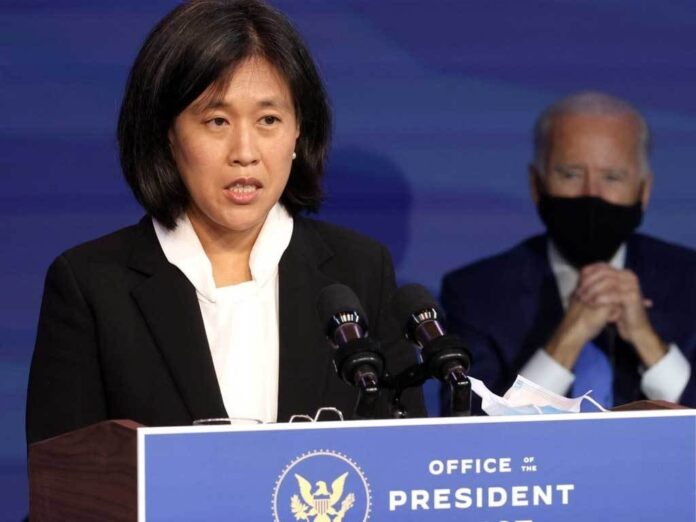WASHINGTON: US Trade Representative Katherine Tai on Monday will seek new talks with China over its failure to keep promises made in a “Phase 1” trade deal struck with former president Donald Trump, but will not pursue “Phase 2” negotiations over Beijing’s state subsidies and other structural issues.
Senior Biden administration officials said Tai will pursue a virtual meeting with Chinese Vice Premier Liu He to discuss the trade deal “soon” while starting a “targeted” process to revive exclusions for certain Chinese imports from punitive US tariffs.
However, she will not rule out the use of new tariffs to push China to meet the Phase 1 commitments made under Trump, said the officials, speaking on condition of anonymity.
Tai will deliver long-awaited remarks outlining the Biden administration’s China trade strategy at the Center for Strategic and International Studies, a Washington think-tank, at 10 a.m. EDT (1400 GMT).
“For too long, China’s lack of adherence to global trading norms has undercut the prosperity of Americans and others around the world,” Tai is expected to say during her remarks, according to excerpts from her speech shared by the White House.
Tai will also say that she intends to have “frank conversations” with her counterpart in China. “That will include discussion over China’s performance under the Phase One Agreement and we will also directly engage with China on its industrial policies.”
Tai will not rule out the use of any trade tools, to bring China into compliance with the deal, officials said, but did not offer a time frame for such actions. The deal is scheduled to expire at the end of 2021.
One of the administration officials told reporters on a preview call that China has not met commitments it made under the phase one deal. Excerpts from Tai’s remarks show she will raise commitments made by China that were intended to benefit American industries, including agriculture.
The Phase 1 deal was crafted at the end of 2019, just as the coronavirus outbreak was starting to emerge in China. The subsequent COVID-19 pandemic caused the steepest drop in global GDP since the 1930s Great Depression, wreaking havoc on trade flows and global supply chains, which continue to struggle as demand recovers.
China agreed to boost purchases of US farm and manufactured goods, energy and services by $200 billion above 2017 levels over two years.
The deal, which halted escalation of a trade war that heaped tariffs on hundreds of billions of dollars worth of goods from both countries, also called for China to improve protections for some US intellectual property and market access for American agricultural biotechnology and financial services firms.
The coronavirus pandemic hit Chinese purchases of US goods hard, and they have been running at only 62% of the target, according to estimates by Chad Bown, a senior fellow at the Peterson Institute for International Economics.
US President Joe Biden kept in place the tariffs imposed by Trump as Tai conducted a top-to-bottom review of China trade policy. Biden officials have said little about their strategy, focusing instead this year on rebuilding ties with US allies to present a more united front to Beijing.
A system of exclusions from the tariffs of up to 25% on Chinese imports expired at end of 2020, except for some medical imports needed to fight the COVID-19 pandemic. US officials said Tai would relaunch a new, “targeted” tariff exclusion process and would “keep open the potential for additional exclusion processes in the future.”
China ‘may not change’
The United States will not pursue “Phase 2” negotiations with China on deeper structural issues such as massive subsidies to vital industries that skew global markets, because Beijing is “doubling down on its authoritarian state-centric approach,” officials said.
Tai will run through a history of China’s failure to live up to its trade and reform commitments over the past two decades, from its accession to the World Trade Organization to the Phase 1 deal, the officials said.
“We recognize that China simply may not change, and that we have to have a strategy that deals with China as it is, rather than as we might wish it to be,” one of the officials said.
The officials said the Biden administration is pursuing investments in technology, education and stronger supply chains to boost US competitiveness with China and will continue work with other major democracies to address China’s “non-market” behavior.
The United States would pursue a flexible approach to its trade relationship with Beijing, with its actions tailored to Beijing’s response, one official said, adding: “It takes two to tango.”
“We do not want to take any options off the table, or preemptively box ourselves into a set course of action,” the official said.




